English transcript
Hello, my name is Nina Balmaceda, and I serve with the Center for Reconciliation at the Duke Divinity School and today I am going to be sharing about the Word Made Flesh methodology. I am very happy to be able to share this time with you and to greet you warmly all of you around the world who are participating in this year’s Stott-Bediako Forum on Peace Building and Conflict Transformation. I am honored to bring greetings as well from my colleagues at the Center for Reconciliation at the school of Divinity of Duke university. Our university is located in the city of Durham in North Carolina in the United States. I want to express my gratitude to my good friends, Tori Greaves, Shadia Qubti, Nina Mantalaba, and all the forum organizers for inviting me to share about the Word Made Flesh Methodology, which our center has developed, and we hope it will be a great blessing to all of you.
Very quickly, let me share about the purpose of our center. We exist to contribute to and support the theological formation of faith-based communities and leaders in the journey of transformation and reconciliation. We seek to encourage our sisters and brothers around the world who are already serving in the fields of transformation, peace building, justice, and reconciliation, as well as groups and individuals who are interested in starting to cultivate this ministry in their own lives and in their communities.
We learn from and with partners around the world. We are very grateful for all of our partners in the Americas, in Africa, and in Asia. These different initiatives for reconciliation are unified by a single vision. This vision becomes contextualized in each of those regions and that vision is what we call The Word Made Flesh.
The Word Made Flesh as you can probably recognize has been inspired in the Gospel of John chapter 1 verse 14, that declares the Word was made flesh and dwelt among us.
God became flesh and therefore it is a theological vision. The Word who is God is at the core of our vision and at the core of our work. The Word became flesh, the Word became one of us! God walked in our shoes, in the person of Jesus of Nazareth. God walked among us.
The Word Made Flesh is also a contextual methodology. Becoming flesh means becoming culture, becoming history, becoming a people. The Word becomes part of a community. Not only of an idea or a theory or a you know an abstract theology- the Word becomes part of a real community on this planet. Therefore the place from which we are doing theology, in living it out, matters greatly- where we place ourselves in, who we identify with, inform how we discern what the Lord is asking of us.
The Word Made Flesh is also a methodology to inspire integral mission. In Jesus Christ, transformation and reconciliation are possible. God is seeking to reconcile all things to Himself. God wants to reconcile everything; and nothing has been left out of this reconciling purpose. And we do live in a world that needs reconciliation desperately. Now I have to give credit to my friends at Peace and Hope- this is a photo of the ministry in Peru and these children in Huánuco in the highlands of Peru are learning to be reconciled with one another, and also to be reconciled with the land, a land that has suffered great abuse and these people and our sister there is teaching children to respect the land, to respect creation, and to be good stewards of what God has given us.
Now the Word Made Flesh is also a practical vision. The Word that became flesh dwelt among us. it is a practical vision, not just theory as we said earlier, or a mere philosophical truth, disconnected for life, from life, in our own contexts. In our Word Made Flesh methodology, theology and life go hand in hand. So the question is, how does it matter that our Lord became flesh? That Jesus is God and also fully human for these people, people who are suffering exploitation, people who are suffering discrimination for their origin, their language, their culture, people who are demanding that their rights be respected as equal citizens? How does it matter that we are concerned about reconciliation for people that have a good life and they are happy? What does the Lord and what does the Word of God have to tell us in these different contexts?
It is therefore an invitation to people serving in the church, in grassroots organizations, in NGOs, and in the academia. Through the Word Made Flesh methodology, we seek to bring together efforts carried out by the church, by academia, by non-profit organizations, and by grassroots groups that are working in the fields of transformation, reconciliation, justice, and peace building- recognizing that every group, every collective, and everyone, has something to contribute to this cause.
The Word Made Flesh methodology recognizes that reconciliation is a pilgrimage- a pilgrimage where the church needs the academia, and that academia needs people working on the ground, and in the church, and then those who are working on the ground also need those who work in academia. Together, we support one another because reconciliation, at least in the way we understand it, is a pilgrimage. And I invite you to consider this seriously with these two images of brothers and sisters in India in pilgrimage. I love those mountains. They made me think of mountains in my own home country, in Peru, and this photo that you can also see, that is a photo from Peru of a pilgrimage of an indigenous group. I unfortunately have never participated of that particular pilgrimage, but I hope one day I will, and I invite you to see reconciliation and the cause of justice in transformation and peace building as a pilgrimage.
But not a pilgrimage that we can carry out individually. It is not individual, an individual calling only, or merely. It is a collective pilgrimage. It’s an invitation to form a new WE. This collective pilgrimage has several stops or stations. Each station has a key question for you and me to answer, and we must consider them with great attention.
The first station in our pilgrimage asks the question: Where are we going? Right? If we are leaving our homes for it, we need to figure out what our destination is. That’s what we- that’s where we start, and the answer we need to identify is that we go towards God’s new creation. That is our destination and that has already been achieved in Christ. God has, that will be surrounded by countless multitudes from different ethnic, cultural, and language backgrounds. You probably remember those passages across the Bible but particularly, Revelation 7, verses 9 through 17 gives us a very clear image of our destination. And based on that destination, we direct our efforts. We find orientation. So that we can walk together towards that future. We celebrate diversity because we know God loves it. The diversity of peoples will not disappear when we arrive at our final destination. We will be reconciled and united, but we will be from different tribes and different cultural backgrounds in different languages. But we don’t stop there, right? We could maybe mistakenly think, “okay that’s all, that’s been achieved, we have nothing to do, and we just can sit down and sing and wait for this great future to happen.” I don’t think ,and we are the Center for Reconciliation, we don’t think that’s what God intends. Actually, this is just the beginning. Now that we know where we are heading, it is very important to consider a second question.
And the second question, or the second station for us to meditate about is what is happening here. We ask ourselves these questions as a collective and individually- What is happening? And we recognize that God has planted us in a particular place and in a particular community. Where we are and who we choose to identify with matter, matter greatly when we ask this question. Because from that place we will observe and we will pay attention to the painful realities of our world.
And by recognizing where the Lord has planted us, in realizing what a painful reality it is, we receive the gift of lament. In response to our genuine desire to see what is happening around us, God offers us the gift of lament. Just a few examples of the teachings about lament in the Bible- obviously the book of Lamentations is an excellent way to learn about lament. As you know, the book is an expression of the pain of the people of Israel for the destruction of their holy city, Jerusalem, but also Isaiah 59 is a place where God expresses his lament. He is feeling so disappointed that people are not seeking justice. In fact, this passage says that God is appalled that no one in Israel was seeking justice for the poor, justice for the most vulnerable. And there are many others- Psalm 74, Psalm 137, among others. And also I would like to just mention this passage in the life of our Lord Jesus Christ. The Lord Jesus arrived at Jerusalem, he was, you know, in a high place looking at the city, and he started lamenting. The people of Israel, the people of Jerusalem did not understand why he had gone, and he lamented. And it is through lament that we can humble ourselves before our Creator. If you are somebody like this servant who cares, and is very serious about the call to do justice, you probably know by heart Micah 6:8. And Micah 6:8 is an invitation, and a very powerful reminder for us to do justice that God demands from us to do justice, but also to love mercy, to be compassionate for those who suffer, but we should never forget the third calling- to walk humbly. And I have found personally in my life that doing justice not always guides me to a path of humility, that it is lamenting, it is the gift of lament when we break before our Lord, that he actually shatters our pride. And as we do that, as we recognize that we cannot change these painful realities by ourselves, then our Lord and his, through his Spirit, works in us and help us to be, helps us to be better prepared to discern God’s direction in our lives.
So I would like to submit to you, that we need to develop more intentionally the discipline of lament. To lament is not just to complain when things don’t go the way we like. To lament is a spiritual practice in which we honestly look at our present realities and we see how God’s creation, human beings, and the rest of creation have been damaged, hurt, and disfigured. As we lament, we seek and discover how God is present in the midst of those painful realities, even though we may see abuse of power, violence, exploitation, terrible social, economic, and political disparities that make certain groups of people more vulnerable to harm, still we can find that God is present even in the worst conditions, and He’s acting and intervening and He’s waiting for us to join to be His instruments for transformation. And we seek those signs of new creation, in the midst of realities that are very painful, that invite us to lament and cry. I feel like I need to explain to you this picture. Some of you probably recognize it, but some of you in different regions of the world may not be familiar. This is another photo from my country, Peru, and these are people from a community called Putis in the highlands, and that it is a procession, a pilgrimage for a funeral. In those coffins are the remains that have been just excavated from mass graves, and they are finally, decades later, after the end of the war in Peru, when people saw their loved ones being executed, suffered massacres, disappearances, this community is finally able to say goodbye to their loved ones and give them a dignified funeral and burial. My brothers and sisters from Peace and Hope, Paz y Esperanza, in Peru have been, and continue to be very active, in accompanying these communities who have suffered so much, in lamenting with them, and in seeking justice for them.
So as you can see, this invitation to lament, genuine lament, is probably the most opposite to an attitude of escapism. I don’t know if I’m pronouncing that word right- escapism, which is a mental diversion to retreat from unpleasant realities through diversion, or fantasy. Genuine lament is exactly the opposite. It is an invitation that God makes to us to engage reality, to resist the temptation of false triumphalism. Lament helps us to get clarity about what is happening, and allows the spirit, the Holy Spirit, to move us to invoke our Lord’s presence in his intervention and direction for what God is calling us to do, because we do not lament like those who do not have hope. Lament is the school of authentic hope. It prevents us from being alienated, alienated from our communities, in our responsibilities, as citizens in our societies and this brings us to the third step or third station in our collective pilgrimage.
We seek hope! And the key question is: where do we see signs of transformation and liberation? This does not mean that we are looking at life through rose-colored glasses In a way, the Word Made Flesh methodology invites us to put on glasses, and honestly without these glasses I couldn’t see a thing, but these glasses that this methodology offers are actually helping us to see with more clarity, with more emphasis, in a way as a magnifying glass, to see reality in all of its painful characteristics of abuse, of power, violence, hunger, injustice, disparities in access to opportunities, discrimination, racism. But we can also use this methodology to help us focus in trying to find those signs of transformation and liberation. And this hope is not mere optimism that somehow magically things are going to get better.
Actually hope is hard. Augustine of Hippo referred to hope as a mother. And he said along time ago, that Hope has two beautiful daughters. Their names are Anger and Courage. Anger, at the way things are, and Courage to see that things do not remain the same as they are today.
Anger, because the way in which things have been damaged by injustice, inequity, the lack of love of neighbor, and the lack of compassion, produces indignation in us as it produces indignation in God. And Courage- we need to be courageous, to do something under God’s direction to transform those terrible realities, into realities of hope. So seeking hope through the intentional observation of reality, seeking signs of transformation and liberation is a process of questioning ourselves about what we can do together and how we can be used by God to reject violence and injustice and be willing for God to use us to transform those painful realities in our own communities and even in wider society. So this invitation to look hard with Anger but with Courage, which are the daughters of Hope, invites us now to our fourth and last station.
And this last station is about our vocation. And the key question the Word Made Flesh methodology invites us, invites us to consider is- Why me? And why am I part of this calling? At the Center for Reconciliation we believe that God wants to build a humble body of leaders, of transformational leaders, who carry out this ministry of reconciliation in a holistic way as part of what He is doing to transform the world and reconcile all things. So it is time for us to ask ourselves, individually, and especially as a community, what the Lord is inviting us to do.
And probably, of course, this will depend a lot where you are planted, who is surrounding you in this pilgrimage, what specific expressions of injustice and violence are present in your community and according to your context, you as a community will respond. It may be that it’s very relevant that we affirm the ‘memoria,’ the memory of the suffering of people in our community that we don’t allow those who are more powerful to ignore the rights, to ignore the suffering of people whose lives have been destroyed by injustice. It may be that it requires us to unite efforts for reconstruction, physical reconstruction, helping each other to build what is needed in our community. It may also include a decided effort to confront the cancer of racism and deny the big lie upon which it is based- that human beings can be divided in races. Race is just a social construct. Let’s resist that. Let’s affirm our unity as human beings, our equality as human beings, our character in our hard work, our common identity as human beings, and celebrate our cultural heritage, our ancestry, our language, and our cultural identity, as well, but not to discriminate against others, but to celebrate the great diversity that God has gifted this world with. So, in terms of also a great, another great injustice that is causing so much suffering, let’s reject gender discrimination like this young lady in her school advocating for freedom from gender violence in her school and in her community, or these brothers and sisters in the Caribbean getting ready to work together to transform their community.
How we become the new WE that God wants to build up. How we join efforts to oppose violence, racism, and other forms of discrimination, hunger, and justice. And how we can model, not just announce or declare with our Words, but actually model the Kingdom of God for all to see, is an invitation from God to do it contextually to do it where we are planted, to do it collectively, and I look forward to a chance to answer any questions, to engage in dialogue with many of you, and especially for all of us in community to come to God and ask the question- How you want to use us? What is this calling that you are giving us today, for here? Muchas gracias!
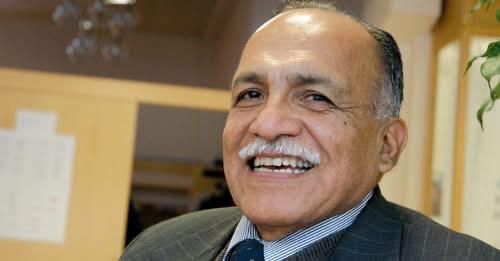
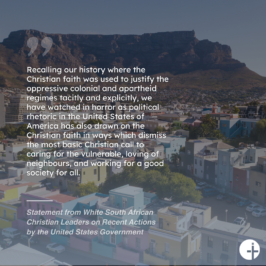
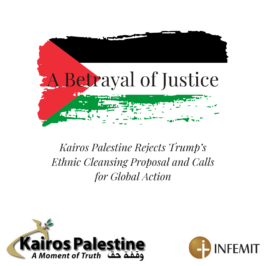

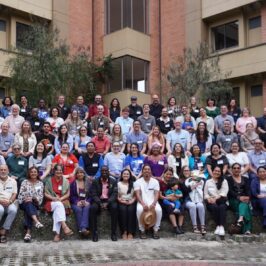
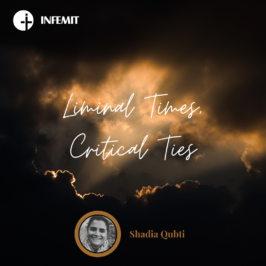
Leave a Reply